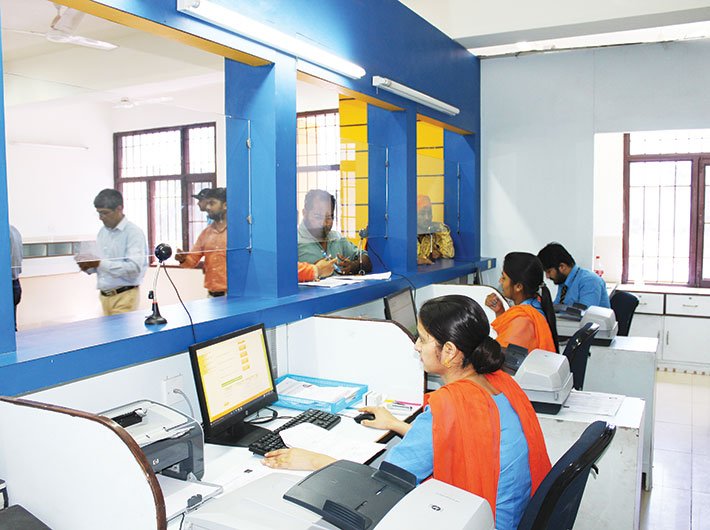Punjab has revamped its Sewa Kendras, which allow the common man to access government services at one place via the digital platform. But more needs to be done
It’s a hot and dull afternoon. The streets of Mohali district in Punjab are almost empty. The dullness is also reflected inside the Mohali Sewa Kendra. Except for four women there is nobody inside the centre. Wearing uniformed pale blue salwar kameez and an orange dupatta, the women are quietly working behind their counters. The silence is disrupted every now and then with a sudden clatter on the computer keyboard.
“In afternoons, there is usually less rush. People mostly come in the morning hours. Usually, 35 to 45 people visit the centre in a day,” says Priya Sharma, centre coordinator.
The Mohali Sewa Kendra is one of the 2,147 active Kendras across Punjab. It serves as a one-stop centre for citizens to avail a range of government services online, including certificates of birth, death, marriage, and arms licence. The Punjab government has invested a sum of Rs 400 crore in the Sewa Kendra project. In 2016, however, it handed over this project to a Delhi-based company called BLS International on a five-year contract. As per the contract, the private outsourcing company will provide manpower and equipment to the state government to run these centres. Land and software, on the other hand, will be provided by the state government.
“In May, we signed the agreement with the state government, and by June-end they started handing over the centres for putting up the system and people. In July, we started equipping the Sewa Kendras, hiring people and training them. By November, we activated all the centres in the state,” says Nikhil Gupta, managing director, BLS International.
Gupta further says that around 2,000 to 3,000 people visit each centre every day – a claim not in tandem with the centre coordinator’s statement though.
Before 2016, Sewa Kendras were called Suwidha Kendras, which delivered government-to-citizen (G2C) services. They were handled entirely by the state government. “Most Suwidha centres were in the district commissioner’s office or in big cities. Also, the handling process was completely offline in those centres. And therefore, transparency was a huge challenge,” says Vinesh Gautam, consultant, department of government reforms, Punjab.
He adds, “The number of Suwidha Kendras was low. There were only 160 centres before and now there are more than 2,000. There were other centres too along with Suwidha Kendras where government services were delivered. Citizens were confused where to go. So the government decided to open a common centre where all the services will be available under one roof.”
Though the whole idea to rope in a private player and turn a Suwidha Kendra into a Sewa Kendra was to promote transparency and ensure timely delivery of services, yet these Kendras still struggle with numerous challenges.
Karnal Singh, a retired army officer, from Zirakpur block, Mohali, on one hand agrees that the new centres are keeping middlemen away from looting the citizens. But on the other hand he feels that there are certain issues that still need to be addressed. “I applied for a senior citizen card last year. I received an SMS saying that my application has been rejected due to incomplete submission. Now, how am I supposed to know what is left incomplete in my application?” asks Singh shaking his head in disappointment.
In her defence, Priya Sharma of the Mohali centre says that the Kendra is not able to process Singh’s application because of lack of documents. “We don’t know which documents are missing because the government departments communicate directly with citizens through SMS. We only process the application,” she says.
But the biggest hindrance which these centres face is that of the server network. There are days when the server doesn’t function, resulting in slow processing of customers’ applications. “Citizens who come to us don’t understand that we can’t do anything when servers are down. They become impatient as the queue of people gets long. Once, the server was down for 15 days. It becomes difficult to handle the crowd in such situations.
“This creates a lack of trust between the citizens and us. They don’t want to come here if their work is not done,” she adds.
But Gautam from the state government’s reforms department feels that it is difficult to identify if the server problem is coming from the government’s side. “It is difficult to pinpoint if the problem is in our servers or is it of the internet service providers. Moreover, connectivity is a huge challenge that these centres are facing. The centres are only dependent upon BSNL, the state-run internet service provider,” he says.
Defending his position on the server issue, he further says, “We receive 21,722 applications in a day on an average. Servers are working, that is why so many applications are getting processed. Earlier, it was around only 8,000 to 10,000 applications.” Moreover, there are many sites where data cards have to be used, which offer only 2G speed, so the server naturally becomes slow.
The centres are also reeling under the challenges of digitisation and shortage of manpower. At present, 77 G2C services are delivered via these centres. Out of these, only 51 services are end-to-end digitised. For the rest, files are moved manually at the backend, which results in delay of service delivery and lack of transparency.
“Under the Right to Service Act, there are 223 services which need to be digitised and offered through Sewa Kendras. Initially, the government gave us 77 services, which are available to citizens. Hopefully, in two-three years, all services will be digitised,” says Gupta.
There is, however, no fixed timeline from the government for making these services digitised. “We are targeting to digitise 100 services within one year,” says Gautam.
On the manpower front, work overload and lack of training are the major issues which the Sewa Kendra project is facing. “At present, we are only looking forward to make the existing centres stable and efficient. It is a big project,” says Gautam. n
taru@governancenow.com
(The article appears in the May 1-15, 2017 issue)

